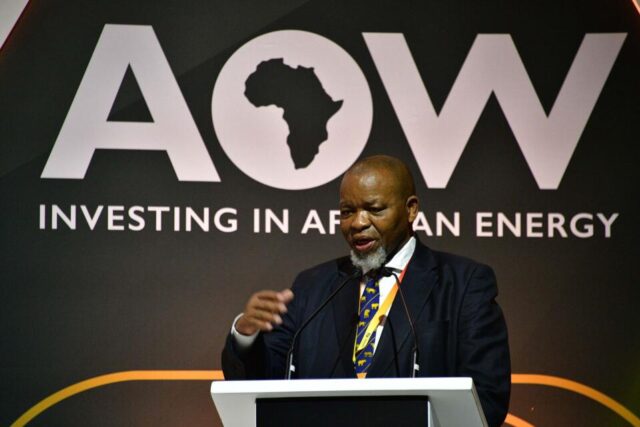Mineral Resources and Energy Minister Gwede Mantashe has blamed environmental organisations who are against the exploration of fossil fuels for some companies moving their development projects away from South Africa.
MINERAL Resources and Energy Minister Gwede Mantashe has blamed environmental organisations who are against the exploration of fossil fuels for some companies moving their development projects away from South Africa.
Mantashe was speaking at the 2023 Africa Oil Week at the Cape Town International Convention Centre (CTICC) on Tuesday.
The conference is focused on “Maximising Africa’s Natural Resources in the Global Energy Transition”.
He said that NGOs should be registered and should be forced to disclose their funders.
According to Mantashe, some oil companies had retracted development projects and went ahead with them in neighbouring countries such as Namibia, while other projects were in limbo.
He said millions if not billions of rand were lost.
Among the companies he cited that have seen a backlash or protest actions from environmentalists were Shell and Total.
“Foreign-funded NGOs are being used to weaponise environmental preservation to block development in developing nations.” said Mantashe.
“This is a reality that we are faced with in South Africa, hence we demand that these NGOs be registered and be made to declare their source of funding, as is done with political parties.
“There must be the same rules and standards for everyone,” he said.
Mantashe alleged that climate change was also being weaponised against the least developed nations, in that instead of considering the realities facing each country, climate change standards were being set by the developed nations and imposed on the developing nations.
Mantashe said there was a further observation that, following Russia’s decision to stop the flow of natural gas, some developed nations reverted to fossil fuels, with some reopening their decommissioned coal-generating power stations.
Deputy President Paul Mashatile emphasised how Africa needed to set the terms and the time frames of its own energy transition as he delivered the keynote address at the event.
“While recognising the need to reduce carbon emissions, we are also aware and committed to economic development. Carbon management techniques should be used to assist with the mitigation of harmful greenhouse gasses whilst we introduce renewable energy sources. Often, we get given resources or money, and we are told we need to transition within a certain period. We must say ‘no’ to that,” said Mashatile.
“We must be able to look at our own needs and to set our own time frames.
“As Africa, we must ‘keep the lights on’ during the transitional period.
“Fossil fuels provide the capacity to manage the transition without further jeopardising our developmental objectives.”
Mashatile said South Africa was confronted with the challenge of electricity shortage, which negatively affected the economy and while the government was exploring alternative energy sources, he was confident discussions in the conference would serve and better respond to some of the challenges the country and continent are dealing with.
He also emphasised the crucial role of partnerships between governments and the private sector in Africa’s exploration of oil and gas resources.
Jacqui Tooke, a member of and spokesperson for Extinction Rebellion Cape Town, which staged a demonstration outside the venue, said Mantashe and the fossil fuel industry, rather than investing in change, invested in questioning and obscuring the message and playing down the risks.
Tooke said the fuel industry’s claim that investing in expanding fossil fuel industries was an economic holy grail for South Africa was flawed on a number of counts.
“If our economy continues to be heavily powered by fossil fuels, our goods will become unattractive and uncompetitive as countries seek to decarbonise their supply chains and impose carbon taxes to disadvantage carbon-intensive imports.
“Europe is already imposing carbon taxes.There are stranded assets risks if we invest in oil and gas now. If the world is producing more oil and gas than the world demands at the time that South Africa starts producing, South Africa could struggle to find markets and could find itself with investments that have no value.”








